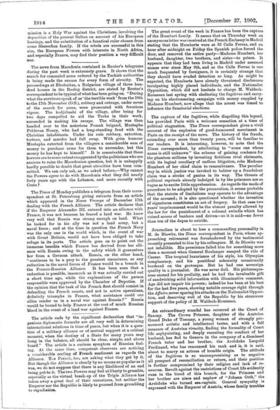The capture of the fugitives, while dispelling this legend, has
provided Paris with a welcome sensation at a time of political stagnation. The Times correspondent gives a vivid account of the explosion of good-humoured merriment in Paris on the receipt of the news. The history of the frauds, extending over more than twenty years, will be familiar to our readers. It is interesting, however, to note that the Times correspondent, by attributing to "some one whose name is still unknown" the scheme of gaining credence for the phantom millions by inventing fictitious rival claimants, with its logical corollary of endless litigation, robs Madame Humbert of her chief claim to remembrance. The peculiar way in which justice was invoked to bolster up a fraudulent claim was a stroke of genius in its way. The threats of political reprisals already indulged in by the prisoners are so vague as to excite little apprehension. As regards the mode of procedure to be adopted by the prosecution, it seems probable that the statute of limitations may operate to the advantage of the accused; it is also questioned whether the invention of signatures constitutes an act of forgery. In that case two years' imprisonment would be the utmost penalty allowed by the law for the punishment of a colossal swindle which has ruined scores of bankers and driven—so it is said—no fewer than ten of the dupes to suicide.






































 Previous page
Previous page